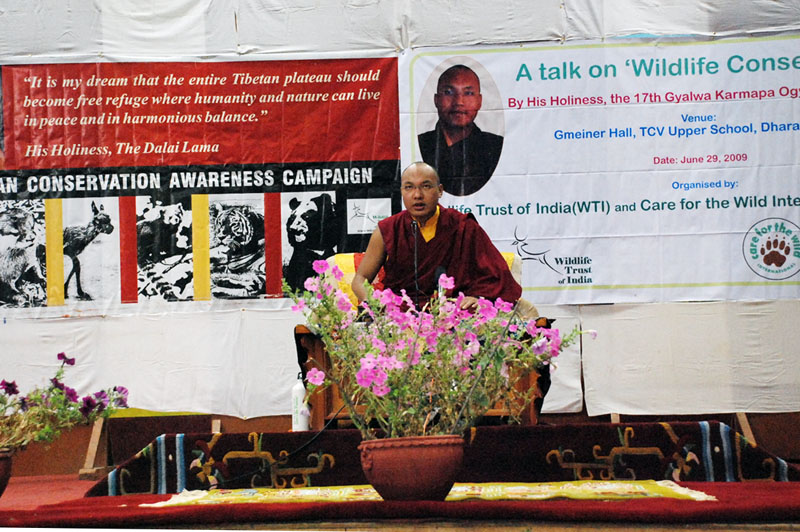 Dharamsala: His Holiness the 17th Gyalwa Karmapa Ogyen Trinley Dorje, today, appealed to his fellow Tibetans not to harm wildlife, at an awareness event organised today in Dharamshala, India by Wildlife Trust of India (WTI) and Care for the Wild International (CWI).
Dharamsala: His Holiness the 17th Gyalwa Karmapa Ogyen Trinley Dorje, today, appealed to his fellow Tibetans not to harm wildlife, at an awareness event organised today in Dharamshala, India by Wildlife Trust of India (WTI) and Care for the Wild International (CWI).Animals are not our enemies. We are all interdependent; every animal has a role to play in the ecology by being a part of the food chain. If you remove one layer, the entire chain is affected. Even while talking in the interest of human beings, by saving wildlife, you are ultimately helping yourself, said His Holiness the Karmapa, addressing the audience at the TCV Upper School, Dharamsala, the venue for the event.
From the Buddhist viewpoint, we say every sentient being is a mother sentient being. We believe in bringing no harm to others including animals, but the ground reality is that this is being neglected. Some may believe that the environment is so huge that it cannot be affected by the action of one person. However, individuals can make lots of differences; the kind of difference, whether positive or negative, depends on the character and belief of humans, His Holiness added.
Dr Barbara Maas, Chief Executive, CWI, said, One of the key principles of Buddhism is compassion towards all sentient beings. Yet, the life of each and every animal killed for its skin and body parts ends in an act of violence. Cumulatively, this violence has consequences not only for the fate of individuals but for that of whole species. The list of animal species threatened with extinction as a result of human behaviour grows longer and every year. It currently stands at over 7,200. If our own species continues to extinguish others, it will spell disaster for us too, because we are part of nature and cannot survive in isolation.
The event was a part of the Tibetan Conservation Awareness Campaign (TCAC), a WTI-CWI project aimed at spreading conservation awareness among Tibetans. The campaign was launched by His Holiness the Dalai Lama on April 6, 2005, to address the involvement of Tibetans in wildlife crimes and the use of wildlife articles in Tibetan medicines and traditional dresses.
The importance of this campaign has been highlighted by the recent arrest of four alleged Tibetan wildlife traders in eastern Nepal late last week. About 23 deer traps and parts of Impeyan pheasant (Lophophorus impejanus) the national bird of Nepal listed in Appendix I of CITES, were among the articles reportedly seized from their possession.
Tibetan leaders wield tremendous influence on Tibetan people. So, we approached leaders of various Tibetan sects for their blessings and support for our campaign to help conserve wildlife, said Ashok Kumar, Vice-chairman, WTI.
In 2006, a conservation message by His Holiness the Dalai Lama had generated tremendous emotional response, culminating in several instances of wild animal skin burning by Tibetans across Tibet as well as in Dharamsala. The skin burning episodes- an indication of Tibetans shunning use of wild animal articles, continued sporadically, with latest incidents reported as recent as April this year.
Four years ago, TCAC was a vague idea in the minds of a few people with faint hope in their hearts. Since then it has become not only one of the most successful conservation initiatives the world has ever seen, it has also set a new standard for how the right attitude towards nature, of which we all are a part, can make the world a better place. The unprecedented success of TCAC is due to you, the Tibetan people, including the most famous of them all, His Holiness the Dalai Lama, added Dr Maas.
Over the years, TCAC field officers of Tibetan origin have visited urban areas as well as remote rural areas to spread the message of His Holiness the Dalai Lama and to spread conservation awareness among Tibetans. Till date, the TCAC campaign has reached 53 Tibetan settlements, 68 schools and 106 monasteries across India, in addition to a few in Nepal.
We have observed a visible increase in awareness levels within the Tibetan community, but obviously our work is far from complete (as proven by the arrest last week in Nepal). The words of His Holiness the Karmapa will help fortify our campaign and benefit the cause by leaving a lingering message in the minds of young Tibetans and adults alike, Kumar added.


![Tibet has a rich history as a sovereign nation until the 1950s when it was invaded by China. [Photo: File]](/images/stories/Pics-2024/March/Tibet-Nation-1940s.jpg#joomlaImage://local-images/stories/Pics-2024/March/Tibet-Nation-1940s.jpg?width=1489&height=878)















